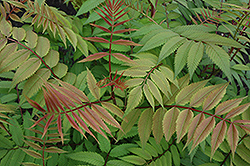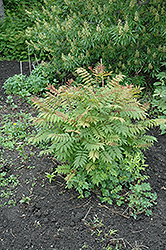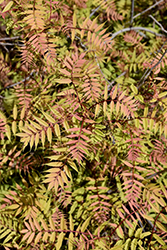Sem False Spirea
Sorbaria sorbifolia 'Sem'
Height: 4 feet
Spread: 4 feet
Sunlight:
![]()
![]()
Hardiness Zone: 3
Other Names: Ural False Spirea, Ash Leaf Spirea
Description:
An exciting new development for gardeners and very different from the species, the foliage of this compact rounded shrub emerges with rich shades of pink and red fading to a cheery chartreuse with rich autumn tones, showy white plumes of flowers in summer
Ornamental Features
Sem False Spirea features airy plumes of white flowers rising above the foliage from early to mid summer. It has attractive chartreuse deciduous foliage which emerges cherry red in spring. The pinnately compound leaves are highly ornamental and turn an outstanding coppery-bronze in the fall. The smooth bark and rose branches are extremely showy and add significant winter interest.
Landscape Attributes
Sem False Spirea is a multi-stemmed deciduous shrub with a more or less rounded form. Its average texture blends into the landscape, but can be balanced by one or two finer or coarser trees or shrubs for an effective composition.
This shrub will require occasional maintenance and upkeep, and is best pruned in late winter once the threat of extreme cold has passed. Gardeners should be aware of the following characteristic(s) that may warrant special consideration;
- Spreading
Sem False Spirea is recommended for the following landscape applications;
- Mass Planting
- Hedges/Screening
- General Garden Use
- Container Planting
Planting & Growing
Sem False Spirea will grow to be about 4 feet tall at maturity, with a spread of 4 feet. It tends to fill out right to the ground and therefore doesn't necessarily require facer plants in front. It grows at a fast rate, and under ideal conditions can be expected to live for approximately 20 years.
This shrub does best in full sun to partial shade. It prefers to grow in average to moist conditions, and shouldn't be allowed to dry out. It is not particular as to soil type or pH. It is somewhat tolerant of urban pollution. This is a selected variety of a species not originally from North America.
Sem False Spirea makes a fine choice for the outdoor landscape, but it is also well-suited for use in outdoor pots and containers. Because of its height, it is often used as a 'thriller' in the 'spiller-thriller-filler' container combination; plant it near the center of the pot, surrounded by smaller plants and those that spill over the edges. It is even sizeable enough that it can be grown alone in a suitable container. Note that when grown in a container, it may not perform exactly as indicated on the tag - this is to be expected. Also note that when growing plants in outdoor containers and baskets, they may require more frequent waterings than they would in the yard or garden.


